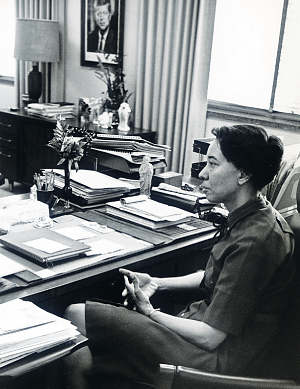No Challenge Was too Daunting for Barrier-Busting Psychiatrist
Abstract
The world of psychiatry lost a valued colleague and ally when Mildred Mitchell-Bateman, M.D., died on January 25 in Charleston, W.Va., at age 89. Mitchell-Bateman, whose career spanned six decades, became the first African-American woman to lead a West Virginia state agency when she was appointed commissioner of mental health in 1962 and the first African-American woman to hold an APA office when she was elected vice president in 1973.

Psychiatrist Mildred Mitchell-Bateman, M.D., was the first African-American woman officer of APA—she was elected vice president in 1973. In 2000, APA honored her with its Lifetime Achievement Award. Mitchell-Bateman, who died in January at age 89, will be remembered for her hard work on behalf of people with mental illness. She is shown here in a 1971 photograph.
Mitchell-Bateman was born in Brunswick, Ga., in 1922, the daughter of a minister and registered nurse. “Her parents instilled in her the value of hard work and education,” said daughter Donna Taylor in an interview with Psychiatric News.
According to Taylor, Mitchell-Bateman was active up until her death—she retired from her job on the board of Mildred Mitchell-Bateman Hospital (formerly Huntington State Hospital) only two years ago and remained involved in church activities.
Tornado-Driven Decision Made
When a tornado ripped through the town of Cordele, Ga., where she was living at age 12, Mitchell-Bateman volunteered with the Red Cross workers to aid survivors, and it was then that she decided to enter the medical profession.
She graduated with a medical degree from the Women’s Medical College of Pennsylvania in 1946 and married therapist William Bateman in 1947. That year she also accepted a position as a staff physician at Lakin State Hospital in West Virginia, a psychiatric hospital established for African-American patients.
She left Lakin to train at the Menninger School of Psychiatry in Topeka, Kan., then returned to Lakin to serve as clinical director. In 1958 she was appointed the hospital’s superintendent.
While at Lakin, she started a program that paired retired people with mentally disabled patients, which was considered a success, and moved patients thought to be untreatable from back wards into the main patient population, which helped them recover more quickly.
In 1962 Mitchell-Bateman became the first African-American woman to run a West Virginia state agency when she was appointed director of the Division of Professional Services of West Virginia’s Department of Mental Health. During her 15-year tenure in this post, she developed a program called “Breaking the Disability Cycle” aimed at rehabilitating psychiatric patients previously labeled as untreatable. She also advocated for community-based mental health treatment and strove to ensure that all patients were treated with dignity.
Remarked Taylor, “She cared deeply about her patients and their lot in life. She wanted them to have a fighting chance, and she wanted them to be perceived as human beings and not just numbers on a chart.”
Mitchell-Bateman again broke new ground when she became the first African-American woman to hold APA office—she was elected vice president in 1973. Former APA President Carolyn Robinowitz, M.D., remembers Mitchell-Bateman as a “gifted, warm, effective leader who combined wisdom, humor, and empathy” in her work. “In her knowledge of and attention to the social and environmental needs of the community, as well as in the care of patients and their families, she exemplified the best principles of our profession,” Robinowitz told Psychiatric News.
In 1977, Mitchell-Bateman accepted a position as founding chair of the Department of Psychiatry at the then-new Marshall University School of Medicine in Huntington, W.Va., and that same year, President Jimmy Carter selected her as one of four psychiatrists to serve on his Commission on Mental Health, which resulted in the Mental Health Systems Act, passed in 1980.
Hospital Named in Her Honor
Mitchell-Bateman served first as associate clinical director and then clinical director of the Huntington State Hospital. In 1999, West Virginia Gov. Cecil Underwood renamed the Huntington State Hospital the Mildred Mitchell-Bateman Hospital to acknowledge her tireless work on behalf of people with mental illness in West Virginia.
Annelle Primm, M.D., M.P.H., director of APA’s Office of Minority and National Affairs, told Psychiatric News that the fact that Mitchell-Bateman’s career developed during periods of the 20th century when few professional opportunities existed for women and African Americans “makes her achievements all the more remarkable.”
Primm added that “the legacy left by trailblazers such as Dr. Mitchell-Bateman should inspire residents and fellows in psychiatry training regardless of their race, ethnicity, or gender. The take-away message from her professional life is that if you work diligently, stay focused, and maintain your passion, you can overcome any obstacle to actualize your occupational dreams.” 



